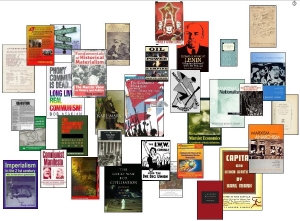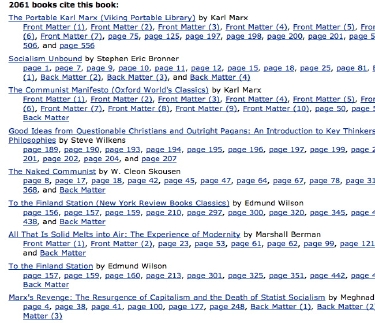About two and a half years ago, when the institute was first developing the idea of the “networked book,” we started a thought experiment which tries to imagine what would happen if Marx and Engels published the Communist Manifesto today and posted it to the web in a form which captured the extensive “conversation” that the essay provoked. About a year ago i made an image for a talk which cobbled together thumbnails from various books on Amazon which were related to the Communist Manifesto:

The point of the image was that these books, which are a concrete manifestation of the conversation, exist as isolated islands which at best can reference each other but which are not connected in the way we might imagine in the networked world being born.
Well, amidst all the discussion of the pluses and minuses of both Google and Microsoft book search, for the past two years Amazon has been quietly doing something exciting.

If you go to the Amazon page for an edition of the Communist Manifesto, you’ll see a reference to 2061 books in Amazon’s list which reference the Manifesto with a hot-link to each reference in each of the books.

The only big missing piece is an interactive semantic map with links between all 2061 books.
if:book
A Project of the Institute for the Future of the Book

What would make this actually useful would be if the citing works were organized in some meaningful way, for instance by user rating (this would give a rough indication of what were the most important works that referenced the book in question).
Another interesting way of making this service actually useful (this would be the interactive component mentioned) would be if, in a process similar to myelination in the brain, links between books and their citations/citing-works became “stronger” (and thus increased in relevance/ranking) as more people clicked on them.
Abuse would of course be a problem, but there’d be some way around it.